
Introduction
Fasting is one of those words you’ve probably heard many times in church, but maybe it still feels like a mystery. Some people see it as an old-fashioned religious ritual. Others treat it like a health trend or a way to lose weight. But in the Bible, fasting is something much deeper. It is about drawing near to God with humility, setting aside physical needs for a time so that our hearts can focus more fully on Him.
When we open Scripture, we see that fasting is not about starving ourselves or trying to impress others. It is about seeking God’s face, softening our hearts, and learning to depend on Him more than anything else. In this article, we’ll take a close look at what fasting really means in the Bible, why God calls His people to fast, and how you and I can practice fasting today in a way that honors Him.
What Does the Bible Mean by Fasting?
In simple words, fasting in the Bible means giving up food , sometimes even drink , for a set time in order to seek God. While many today may fast for health reasons or diets, biblical fasting is spiritual at its core.
It’s not just skipping meals. It’s about replacing that time and attention with prayer, Scripture reading, and worship. When you fast, you’re saying to God, “You are my greatest need. More than bread, more than comfort, more than routine , I need You.”
In the ancient world, fasting was common in many cultures, but the Bible gives it a unique place: it’s not about self-punishment, but self-surrender.
Why Do People Fast in the Bible?
Throughout Scripture, people fasted for many reasons. Let’s look at some of the main ones:
Drawing near to God – In the Psalms and the prophets, fasting often went hand in hand with prayer. David wrote, “I humbled my soul with fasting” (Psalm 35:13). It was a way to quiet the flesh and make space for God’s presence.
Seeking guidance and wisdom – Ezra and the returning exiles fasted before traveling, asking God for protection and wisdom (Ezra 8:21). In the book of Acts, the early believers fasted before making important decisions about leadership.
Repentance and humility – The people of Nineveh fasted after Jonah’s warning, showing their sorrow for sin (Jonah 3:5–10). Joel also called the nation to fasting as a sign of repentance (Joel 2:12).
Preparation for ministry – Before beginning His ministry, Jesus spent 40 days in the wilderness fasting (Matthew 4). His fast wasn’t for show , it was about readiness, surrender, and strength.
Fasting was never just about food. It was about a heart posture before God.
Old Testament Examples of Fasting
Moses on Mount Sinai
Moses fasted for 40 days and nights while receiving God’s commandments on Mount Sinai (Exodus 34:28). His fasting was tied to being in God’s holy presence, focused fully on His Word.
David’s Fasts
David fasted in times of grief and repentance. In 2 Samuel 12, after his sin with Bathsheba, he fasted and prayed for his child’s life. His fasting showed sorrow, humility, and reliance on God’s mercy.
Esther and Her People
When the Jews faced destruction under King Xerxes, Queen Esther called her people to fast for three days (Esther 4:16). Their fast was an urgent cry for God’s protection and deliverance.
Daniel’s Partial Fast
Daniel sought God while in exile by fasting from rich foods, choosing simple meals as an act of devotion (Daniel 10:2-3). This “Daniel fast” reminds us that fasting can take many forms while still pointing to God.
New Testament Examples of Fasting
Jesus’ 40-Day Fast
Before He began His public ministry, Jesus fasted in the wilderness (Matthew 4:1–2). His fast was not just about food; it was about spiritual strength, resisting temptation, and fully depending on His Father.
Teaching on Fasting in the Sermon on the Mount
Jesus taught, “When you fast, do not look somber as the hypocrites do” (Matthew 6:16). He emphasized fasting in secret, with humility, so only God sees. The reward is intimacy with Him, not recognition from people.
The Early Church
In Acts 13:2-3, the church in Antioch fasted before sending Paul and Barnabas on their missionary journey. In Acts 14:23, fasting accompanied prayer when appointing elders. For the early believers, fasting was tied to serious decisions and seeking the Spirit’s leading.
Paul’s Writings
Paul spoke often about self-discipline, likening the Christian life to an athlete’s training. While not commanding fasting, his teaching supports the principle of denying the flesh to strengthen the spirit (1 Corinthians 9:27).
What Is True Fasting That Pleases God?
One of the clearest pictures of true fasting comes from Isaiah 58. God rebuked His people for fasting outwardly while still living unjustly. He said, “Is not this the fast that I choose: to loose the bonds of wickedness, to undo the straps of the yoke, to let the oppressed go free…?” (Isaiah 58:6).
True fasting is not about looking spiritual. It’s about aligning our hearts and lives with God’s will , showing compassion, pursuing justice, and living humbly before Him. God is not impressed by hunger alone. He is moved by humility, obedience, and love.
The Spiritual Meaning of Fasting
At its heart, fasting is spiritual worship. Paul wrote in Romans 12:1, “Offer your bodies as a living sacrifice.” Fasting is one way we do that , offering even our most basic desires to God.
As worship – Fasting is a way to say, “Lord, You are worthy of my full attention.”
As surrender – By fasting, we learn dependence. Every hunger pang reminds us of our deeper hunger for God.
As transformation – Fasting helps reshape desires. It trains us to say no to the flesh so we can say yes to God.
How to Biblically Fast Correctly
Many believers wonder, “How should I fast the right way?” Scripture gives us helpful guidance:
Preparing Your Heart
Before fasting, spend time in prayer. Ask God to search your heart. Confess sin. Set a clear purpose for your fast , whether it’s seeking wisdom, interceding for others, or simply drawing closer to Him.
Choosing the Type of Fast
Complete fast – abstaining from all food for a period (only water).
Partial fast – limiting certain foods, like Daniel did.
Daytime fast – fasting from sunrise to sunset, common in biblical tradition.
Non-food fasts – some believers give up technology, entertainment, or other comforts to focus on God.
Maintaining Focus
While fasting, spend extra time in Scripture and prayer. Each moment of hunger can turn into a prayer: “Lord, feed me with Your Word.”
Ending the Fast Wisely
Don’t rush back into heavy meals. Break your fast with thanksgiving, remembering the lessons God has taught you.
What Kind of Fasting Does God Want?
God is not looking for fasting as an empty ritual. He wants:
Not outward show – Jesus warned against fasting to be seen by others.
Heart and action combined – Isaiah 58 shows that fasting should lead to acts of kindness, justice, and mercy.
Spirit-led fasting – Each believer should fast as the Spirit leads, not just because of tradition or pressure.
Common Questions About Fasting in the Bible
Do all Christians need to fast?
Fasting is not commanded as a law in the New Testament, but it is strongly encouraged as a spiritual practice.
Can fasting be something other than food?
Yes. While biblical fasting is usually food, believers can choose to give up other things that distract them from God.
How long should a biblical fast last?
It depends on your health, purpose, and God’s leading. Some fasted one day, others three days, and some forty days.
Is fasting required for salvation?
No. Salvation is through faith in Jesus Christ alone. Fasting is a discipline for growth, not a requirement for grace.
Practical Tips for Fasting Today
Start small, perhaps with one meal.
Use the time you would normally eat to pray or read Scripture.
Don’t focus on the discomfort; focus on God’s presence.
Keep your fast private. Share it only with those who need to know.
Remember, fasting without prayer is just dieting.
Conclusion
Fasting in the Bible is more than just going without food. It is a sacred discipline that opens our hearts to God, teaches us humility, and deepens our dependence on Him. Whether in the Old Testament or New, fasting was always about seeking God’s will, repenting of sin, and preparing for His work.
When you fast with the right heart, it is not an empty act but a powerful way to draw closer to your Creator. God is pleased when fasting leads to love, justice, and compassion.
If you feel called to fast, begin with prayer. Ask the Lord to guide you, strengthen you, and use your fast to shape your heart. Remember the words of Jesus: “Your Father, who sees what is done in secret, will reward you” (Matthew 6:18).












